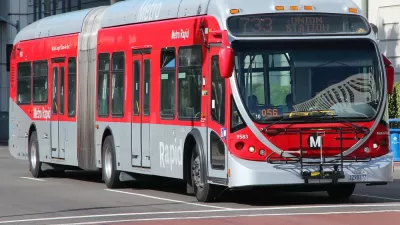Op-ed: Charging road users by how much they drive, not how much gas they buy, is the only sustainable way forward for infrastructure funding.

Earlier this year, President Biden called for electrifying the entire federal vehicle fleet — about 645,000 passenger cars, trucks and vans — putting the nation on track to a green energy transportation future.
General Motors followed shortly after, announcing plans to only produce all-electric vehicles (EVs) by 2035. Several other major automakers either plan to or have already produced EV models, joining Tesla, which has dominated the market for over a decade.
That’s the good news. The bad news? We need to find a way to pay for the repair and maintenance of our roads, bridges and public transit—which all rely in part on gas tax revenues—once we fully transition away from gas-powered vehicles.
Demand for EVs in the U.S. is expected to grow, accounting for a projected 7.6 percent of the passenger car market in 2026, up from just 1.2 percent in 2018. While new EVs are more expensive than conventional vehicles, prices will fall as they become less costly to produce. Federal and state governments also offer a range of consumer incentives such as tax credits, cash rebates and reduced registration fees to boost sales.
In addition to becoming more affordable to purchase, demand for EVs is certain to rise further as drivers become more aware of the money they could save on fuel and routine maintenance.
The growing demand for EVs and U.S. automakers’ production decisions may also reflect a shift in attitude on climate change among Americans. A Pew poll last year found that almost two-thirds of Americans said that protecting the environment should be a priority for the federal government compared to 41 percent in 2008. EV adoption will go a long way towards reducing environmentally harmful carbon emissions, as transportation accounts for almost a third of total emissions, the largest share of any economic sector in the U.S.
But as more drivers ditch their combustion engine cars for the electric equivalent, concerns are rising that revenues in the Highway Trust Fund, a dedicated source of money from the federal gas tax charged at the pump, will further erode. Because the tax has not been raised since 1993 and fuel efficient vehicles have increased in popularity, there has been a growing gap between the money needed to maintain our roads and the amount raised through the Fund. Since 2008, Congress has had to rely on annual transfers from non-dedicated revenue sources to prevent the Highway Trust Fund from running out of money.
With the gas tax becoming more unreliable as a revenue source and EVs on the horizon, most experts now agree that something needs to be done: the question is, what?
FULL STORY: Gas Taxes Pay For Our Roads. What Happens When Cars Go Electric?

Alabama: Trump Terminates Settlements for Black Communities Harmed By Raw Sewage
Trump deemed the landmark civil rights agreement “illegal DEI and environmental justice policy.”

Study: Maui’s Plan to Convert Vacation Rentals to Long-Term Housing Could Cause Nearly $1 Billion Economic Loss
The plan would reduce visitor accommodation by 25% resulting in 1,900 jobs lost.

Why Should We Subsidize Public Transportation?
Many public transit agencies face financial stress due to rising costs, declining fare revenue, and declining subsidies. Transit advocates must provide a strong business case for increasing public transit funding.

Wind Energy on the Rise Despite Federal Policy Reversal
The Trump administration is revoking federal support for renewable energy, but demand for new projects continues unabated.

Passengers Flock to Caltrain After Electrification
The new electric trains are running faster and more reliably, leading to strong ridership growth on the Bay Area rail system.

Texas Churches Rally Behind ‘Yes in God’s Back Yard’ Legislation
Religious leaders want the state to reduce zoning regulations to streamline leasing church-owned land to housing developers.
Urban Design for Planners 1: Software Tools
This six-course series explores essential urban design concepts using open source software and equips planners with the tools they need to participate fully in the urban design process.
Planning for Universal Design
Learn the tools for implementing Universal Design in planning regulations.
Caltrans
Smith Gee Studio
Institute for Housing and Urban Development Studies (IHS)
City of Grandview
Harvard GSD Executive Education
Toledo-Lucas County Plan Commissions
Salt Lake City
NYU Wagner Graduate School of Public Service




























